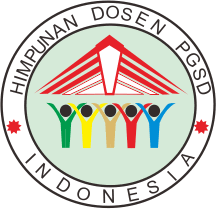Analisis keterampilan berpikir kritis peserta didik pada pembelajaran IPA di kelas IV Sekolah Dasar
Abstract
This study aims to analyze the critical thinking skills of students in science learning in class IV. The method used in this research is qualitative research. The subjects of this study were fourth grade students of SD Negeri 1 Kayugeritan for the 2021/2022 academic year. The data obtained from this study came from the results of tests on students' critical thinking skills in science learning. Test the validity of the data in this study using content validity. The data analysis technique used in this research is using the theory of Miles and Huberman which consists of data collection, data reduction, data presentation, and drawing conclusions. The results of this study are the critical thinking skills of fourth grade students of SD Negeri 1 Kayugeritan are different. There are 20 students who are declared skilled in critical thinking and 7 students who are not yet skilled in critical thinking. Based on the indicators of critical thinking skills, there are still students who have not met these indicators.
Keywords
Full Text:
PDFReferences
M. E. KUSUMANINGRUM, J. SISWANTO, and F. ROSHAYANTI, “Pola Kemampuan Kognitif Dan Keterampilan Berpikir Kreatif Pada Konsep Perubahan Lingkungan Antara Siswa Laki-Laki Dan Perempuan Di Sma Negeri 2 Mranggen,” INKUIRI J. Pendidik. IPA, vol. 9, no. 2, p. 147, 2021, doi: 10.20961/inkuiri.v9i2.39140.
F. H. Cornelius and L. Wilson, Educational Technology. 2021.
E. Care, Assessment and Teaching of 21 Century Skills. Springer, 2015.
S. P. Dewi, I. K. Ardana, and I. G. A. A. Sri Asri, “Model Pembelajaran Snowball Throwing Berbantuan Media Audio Visual Terhadap Kompetensi Pengetahuan IPA,” J. Penelit. dan Pengemb. Pendidik., vol. 4, no. 2, p. 296, 2020, doi: 10.23887/jppp.v4i2.26435.
Y. Vari and B. Bramastia, “Pemanfaatan Augmented Reality Untuk Melatih Keterampilan Berpikir Abad 21 Di Pembelajaran Ipa,” INKUIRI J. Pendidik. IPA, vol. 10, no. 2, p. 132, 2021, doi: 10.20961/inkuiri.v10i2.57256.
Heriwan dan Taufina, “Jurnal basicedu,” J. basicedu, vol. 3, no. 2, pp. 524–532, 2020.
H. Indawati, S. Sarwanto, and S. Sukarmin, “Studi Literatur Pembelajaran Inkuiri Terbimbing Terhadap Kemampuan Berpikir Kritis Ipa Smp,” INKUIRI J. Pendidik. IPA, vol. 10, no. 2, p. 98, 2021, doi: 10.20961/inkuiri.v10i2.57269.
R. H. Ennis, “The Nature of Critical Thinking: Outlines of General Critical Thinking Disposition and Abilities,” Sixth Int. Conf. Think. MIT, vol. 2013, pp. 1–8, 2013, [Online]. Available: http://criticalthinking.net/wp-content/uploads/2018/01/The-Nature-of-Critical-Thinking.pdf.
R. N. Hafni, “21st Century Learner: Be A Critical Thinking,” Second Int. Conf. Educ. Reg. Dev. 2017 (ICERD 2nd), vol. 1, no. 1, 2018, [Online]. Available: http://icerd2017.conference.upi.edu/download/.
P. Anjarsari, “PENTINGNYA MELATIH KETERAMPILAN BERPIKIR( Thinking Skills ) DALAM PEMBELAJARAN IPA SMP,” 2014.
K. Usha, “Watson Human Caring Theory Background of Jean Watson,” vol. 5, no. 1, pp. 28–31, 2019.
I. M. Suarjana, I. W. Lasmawan, and I. M. Gunamantha, “PENGAMBANGAN INTRUMEN KEMAMPUAN BERPIKIR KRITIS DAN SIKAP PEDULI LINGKUNGAN TEMA 8 PESERTA DIDIK KELAS IV SD,” vol. 4, no. 2, pp. 101–111, 2020.
P. a. Facione, Critical Thinking : What It Is and Why It Counts, no. ISBN 13: 978-1-891557-07-1. 2011.
C. Dwyer, M. Hogan, and I. Stewart, “The promotion of critical thinking skills through argument mapping,” Crit. Think., no. June 2014, pp. 97–121, 2011.
J. Heard, C. Scoular, D. Duckworth, D. Ramalingam, and I. Teo, “Critical Thinking : Skill Development Framework.,” Aust. Counc. Educ. Res., no. June, pp. 1–23, 2020.
D. Mellita and E. Elpanso, “Model Lewin Dalam Manajemen Perubahan Teori Klasik Menghadapi Disrupsi Dalam Lingkungan Bisnis,” Mbia, vol. 19, no. 2, pp. 142–152, 2020, doi: 10.33557/mbia.v19i2.989.
E. Sulistiani and Masrukan, “Pentingnya Berpikir Kritis dalam Pembelajaran Matematika untuk Menghadapi Tantangan MEA,” Semin. Nas. Mat. X Univ. Semarang, pp. 605–612, 2016.
P. C.H., “Critical Thinking: Conceptual Framework,” i-manager’s J. Educ. Psychol., vol. 11, no. 4, p. 45, 2018, doi: 10.26634/jpsy.11.4.14221.
L.S, Vygotsky, Mind in Society : The Development of Higher Psychologycal Processes, 1978
Refbacks
- There are currently no refbacks.



